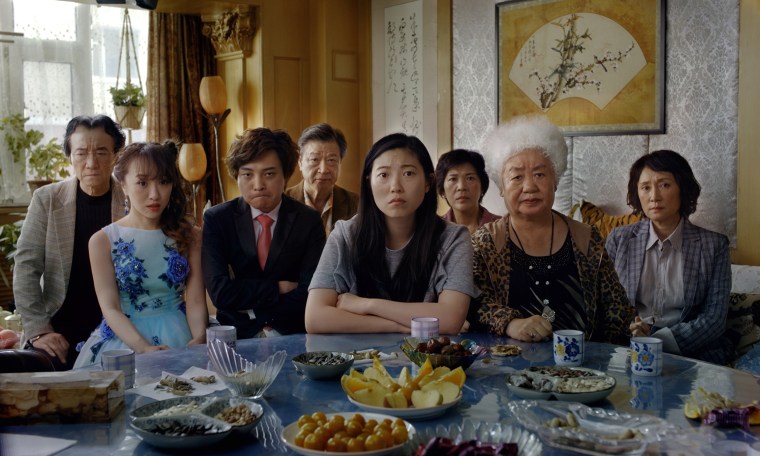When the theater lights dim at Sundance for the premiere of "The Farewell," audiences will be introduced to a different side of Awkwafina, the rapper-turned-actress who made a comedic splash last summer in blockbuster films "Ocean's 8" and "Crazy Rich Asians." But this Awkwafina is stoic while beside her character's grandmother, who is in high spirits despite facing cancer — a diagnosis which the family has decided to keep from the matriarch.
Anticipation is high for "The Farewell," which will make its world premiere Friday in Utah alongside more than 100 features from around the world. (As of Tuesday, when public ticket sales began, every screening was sold out.) That could be simply because audiences are excited to see Awkwafina in a dramatic casting or it could be that the momentum of “Asian August” is having its first snowball effect this winter at the iconic festival.
Lulu Wang, director of “The Farewell,” said she believes the success of last August's films, from "Crazy Rich Asians" to "Searching" (a notable hit out of Sundance last year that was released theatrically in August to critical acclaim), can have an effect on independent spaces.
“It definitely makes an impact. Hollywood is a major part of the culture, the dialogue, and the type of stories we consume,” she said. “Sundance is independent, but there’s a lot of overlap. So much is zeitgeist as well.”
'There is a market'
This year, 10 percent of festivals' films have Asian filmmakers, are set in Asia, or have an Asian country of origin, according to Sundance. A spokesperson was not able to provide numbers on past years, saying they have "not collected enough data." Overall, 36 percent of the festivals films this year were directed by a filmmaker of color, according to analysis by Variety. Sundance also appointed Kim Yutani an Asian-American woman, as its programming director in 2018.
I remember people saying 'Crazy Rich Asians' hitting is great, but there’s no momentum if ‘Searching’ is not going to also do great. It’s not just the glitz, but it shows there is a market for Asian stars if both mainstream and indie movies coming out of Sundance can also hit.
Nancy Wang Yuen
“Sundance has always been great about representation,” said Justin Chon, director of “Ms. Purple,” a film about Asian-American siblings rekindling their relationship, which will make its debut at Sundance. “But nobody gets a free pass. Everything they offer is cream of the crop.”
As conversations around representation continue to dominate the media, debate over the ways in which Asians and Asian Americans are represented have become more important than ever.
For Minhal Baig, whose film “Hala” about a Muslim teen's experience growing up in Chicago and will premiere at Sundance, her hope is that audiences will connect with the universal story about a disconnect between child and parent.
But the cultural nuances of "Hala" are found in the issues the family spars over, like religious adherence, as well as the details of their interactions.

"One of the things that happened in my household when I was growing up is my mom would speak Urdu and I would respond in English, and then my mom would talk to my dad in Urdu. That is very culturally specific to first-gen kids," she said. "So part of the movie is in another language. That was a difficult decision. That was true to us."
Chon said he’s an advocate for balancing a universal message with specific identity messages, making sure diverse creators in both independent space and Hollywood don’t become too narrowly focused.
“We need our own stuff,” he said. “But we’re getting more and more segmented and exclusive to our experience. It’s good because it creates community and empowerment for us. But let’s talk about our problems and what makes us us, but let’s look around and also see where we fit in the whole.”
For those who have been watching and analyzing the trajectory of Asian films for years, like sociologist and author Nancy Wang Yuen, there is a certain school of thought that says in order to truly say an appetite for Asian films exists, indie films need to succeed alongside studio productions.
“I remember people saying 'Crazy Rich Asians' hitting is great, but there’s no momentum if ‘Searching’ is not going to also do great," Yuen said. "It’s not just the glitz, but it shows there is a market for Asian stars if both mainstream and indie movies coming out of Sundance can also hit.”
The next wave of talent
Baig said she sees how the success of “Asian August” could be cyclical, filtering between Hollywood and the independent scene.
“There’s a pipeline for those creatives coming from the independent space,” she said, adding that there seems to be an admitted learning curve among people in power when it comes to Asian stories after the success of last summer. “You had executives take pause and think, ‘How can we serve this audience better? How can we feature more voices? Maybe we misunderstood and under-appreciated this demographic.’”
Baig, along with Wang and Chon, point out Asian content has always been available in the indie circuit, but it may not have been as well known or accessible. But because of the success of a major motion picture, creators across various platforms and mediums could soon be experiencing a domino effect, with several Asian-American producers and writers telling NBC News last summer that they've noticed an uptick in interest since "Crazy Rich Asians" hit theaters.
Chon said he can’t speak to the effect a film like "Crazy Rich Asians" has had on the industry, but he does see how it can shine a spotlight on emerging talent at places like Sundance. (Chon himself was the recipient of Sundance's NEXT Audience Award in 2017 for "Gook," a breakout film about the Los Angeles Riots which he directed, wrote, and starred in.)
“It’s been shown that it’s possible, so I’m predicting there’s going to be a lot more creators," he said. "There are some extremely talented people coming up.”
Building opportunities across communities
Wang said that because she was working in the independent space, her producers took on the project and figured out how to market it afterwards as opposed to trying to create a film for a given market.
“We were trying to break new ground for a type of story being told where there is no formula,” she said. “There was a version of this where I got financing from a studio or a Chinese studio and then it does become very limiting because it becomes a question of, ‘Is it for a Chinese market or American market — or do we try to make it for both?’ Which is very limiting. With independent, there’s no criteria like that.”
You had executives take pause and think, ‘How can we serve this audience better? How can we feature more voices? Maybe we misunderstood and under-appreciated this demographic.’
Minhal Baig
Chon likens being an independent filmmaker without the constraints of stockholders, financial motives and hiring headaches to being a musician with the freedom of creating on a democratized platform. “If you follow these trap artists, they start off on Soundcloud. Once they hit a critical mass, they sign to a record label because they need the machine. It’s a level playing field at first though."
He said this independence can be critical for Asians and other diverse communities who might not have the connections, background, or financial resources.
“I’m always looking for the talent that’s not given a chance. And that doesn’t just happen for Asians,” Chon said. “Also for ['Ms.Purple'], there’s a huge Mexican and Chicano storyline that goes through this film. The Chicano guy is super talented but nobody has given him the time of day. Who is going to do that? Warner Bros. isn’t going to do that."
Follow NBC Asian America on Facebook, Twitter, Instagram and Tumblr.


